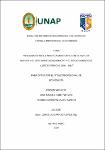| dc.contributor.advisor | Arrué Flores, Jorge Luis | |
| dc.contributor.author | Nube Yactayo, José Manuel | |
| dc.contributor.author | Villacis Fajardo, Ricardo Javier | |
| dc.date.accessioned | 2022-08-02T15:38:20Z | |
| dc.date.available | 2022-08-02T15:38:20Z | |
| dc.date.issued | 2022 | |
| dc.identifier.uri | https://hdl.handle.net/20.500.12737/8199 | |
| dc.description.abstract | The research work determines the influence that the level of employment and economic growth exert on the percentage of inhabitants of the department of Loreto who are in a situation of monetary poverty, in the period 2008-2019. Monetary poverty is defined as the pecuniary inability on the part of the inhabitants to acquire the basic basket of food and not the food necessary to satisfy primary needs. The research work is of a Quantitative type, Descriptive-Correlational level and Non-experimental design; Therefore, once the information on the level of income of families, employment and economic activities in the department of Loreto had been collected, the univariate analysis and application of the OLS methodology was carried out.
After obtaining and discussing the results, it is concluded that during the analyzed period monetary poverty in Loreto was reduced by -35.34%, the employment level variable has a strong and significant negative correlation with the monetary poverty variable (r = -0.817); Otherwise, economic growth does not present any relationship with monetary poverty in the analyzed period (r = 0.022). When jointly analyzing the independent variables level of employment and economic growth with the dependent variable monetary poverty, it is verified that only the level of employment is a determinant of monetary poverty in Loreto (p> t = 0.001), and that a growth of one point percentage in the level of employment generates a reduction of -13.42% of monetary poverty. | en_US |
| dc.description.abstract | El trabajo de investigación determina la influencia que el nivel de empleo y el crecimiento económico, ejercen sobre el porcentaje de habitantes del departamento de Loreto que se encuentran en situación de pobreza monetaria, en el periodo 2008-2019. La pobreza monetaria se define como la incapacidad pecuniaria por parte de los habitantes para adquirir la canasta básica de alimentos y no alimentos necesarios para satisfacer las necesidades primarias. El trabajo de investigación es de tipo Cuantitativo, de nivel Descriptivo-Correlacional y diseño No experimental; por eso, una vez recolectada la información sobre el nivel de ingreso de familias, empleo y actividades económicas en el departamento de Loreto, se procedió con el análisis univariado y aplicación de la metodología MCO.
Después de la obtención y discusión de los resultados, se concluye que durante el periodo analizado la pobreza monetaria en Loreto se redujo en un -35.34%, la variable nivel de empleo tiene una correlación negativa fuerte y significativa con la variable pobreza monetaria (r = -0.817); caso contrario, el crecimiento económico no presenta relación alguna con la pobreza monetaria en el periodo analizado (r = 0.022). Al analizar conjuntamente las variables independientes nivel de empleo y crecimiento económico con la variable dependiente pobreza monetaria, se verifica que únicamente el nivel de empleo es determinante de la pobreza monetaria en Loreto (p > t = 0.001), y que un crecimiento de un punto porcentual en el nivel de empleo genera una reducción de -13.42% de la pobreza monetaria. | es_PE |
| dc.format | application/pdf | es_PE |
| dc.language.iso | spa | es_PE |
| dc.publisher | Universidad Nacional de la Amazonía Peruana | es_PE |
| dc.rights | info:eu-repo/semantics/openAccess | * |
| dc.rights.uri | https://creativecommons.org/licenses/by/4.0/ | * |
| dc.subject | Pobreza | es_PE |
| dc.subject | Estadísticas de empleo | es_PE |
| dc.subject | Crecimiento económico | es_PE |
| dc.subject | Análisis de correlación | es_PE |
| dc.title | Relación entre la pobreza monetaria con el nivel de empleo y el crecimiento económico en el departamento de Loreto, periodo 2008 - 2019 | es_PE |
| dc.type | info:eu-repo/semantics/bachelorThesis | es_PE |
| thesis.degree.discipline | Economía | es_PE |
| thesis.degree.grantor | Universidad Nacional de la Amazonía Peruana. Facultad de Ciencias Económicas y de Negocios | es_PE |
| thesis.degree.name | Economista | es_PE |
| dc.subject.ocde | https://purl.org/pe-repo/ocde/ford#5.02.01 | es_PE |
| renati.author.dni | 41903818 | |
| renati.author.dni | 05321333 | |
| renati.advisor.orcid | https://orcid.org/0000-0002-6914-9415 | |
| renati.advisor.dni | 41578572 | |
| renati.type | https://purl.org/pe-repo/renati/type#tesis | es_PE |
| renati.discipline | 311016 | es_PE |
| renati.level | https://purl.org/pe-repo/renati/level#tituloProfesional | es_PE |
| renati.juror | Pinedo Manzur, Freddy Martín | |
| renati.juror | López Rojas, Mario André | |
| renati.juror | Iturrarán Sandoval, Edgar David | |
| dc.publisher.country | PE | es_PE |


